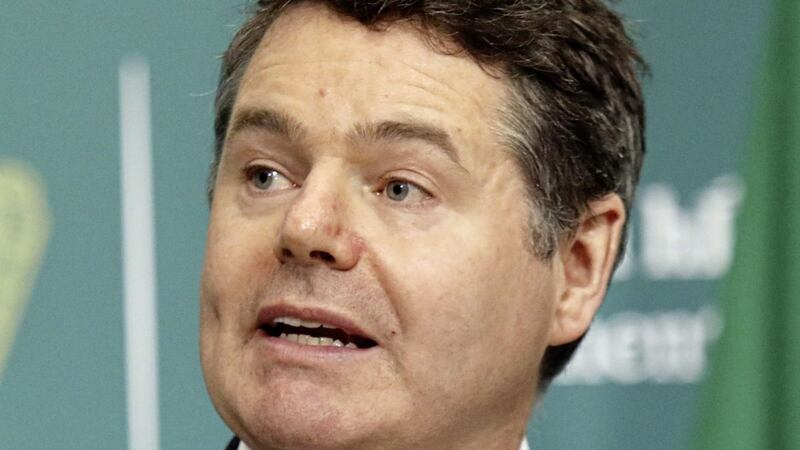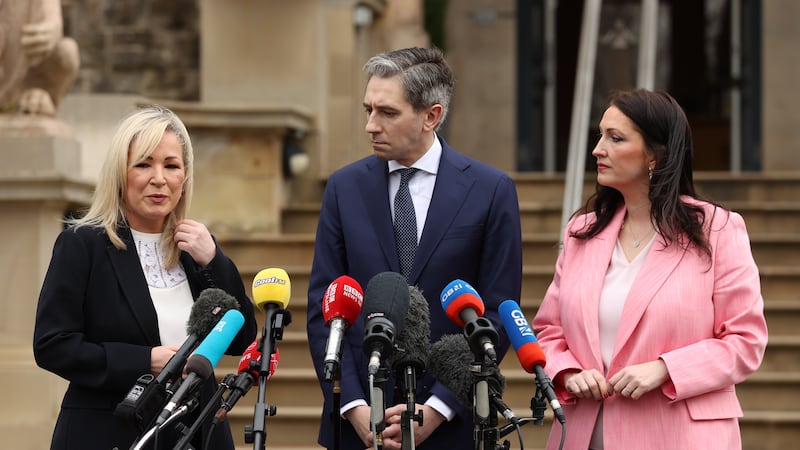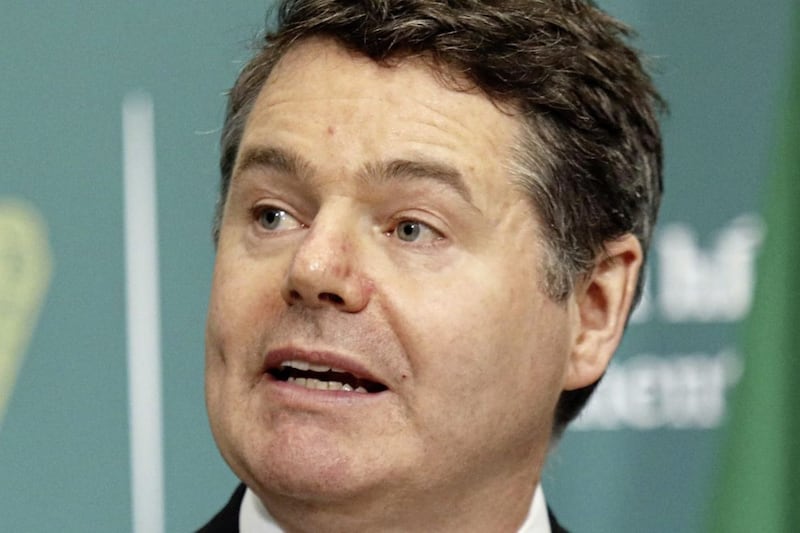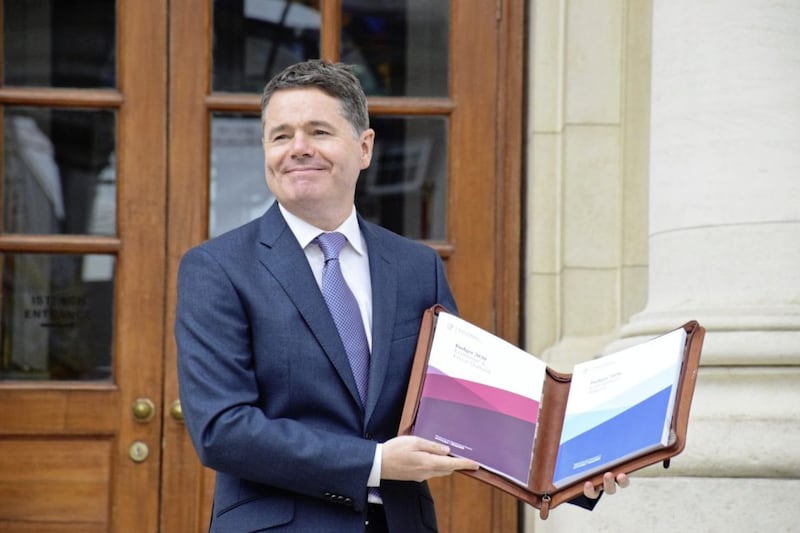Finance Minister Paschal Donohoe has described Covid-19 as the biggest issue the Republic has faced since independence as he began delivering Budget 2021 at the Dáil sitting at Dublin's convention centre.
It is the first Budget agreed by the Fianna Fáil, Fine Gael and Green Party coalition and it is the first time the document has been delivered outside Leinster House.
As he unveiled details of the document this afternoon Mr Donohoe said the country was "now responding to the worst global pandemic in a century".
Mr Donohoe described Covid-19 as "an invisible enemy that has caused great suffering and disrupted so much of what is central to our wellbeing".
"Yes, the test we face is daunting, further demanding choices await," he said.
"Yes, the uncertainty and anxiety about the future of lives and livelihoods is great, and yes we will prevail. We will come through this. And from the ashes of the pandemic together we will build a stronger, more resilient Ireland.
"Budget 2021 is a bridge to that better future."
The Fine Gael minister said the total value of support measures to date amounts to €24.5 billion, nearly eight times last year's Budget plan.
Mr Donohoe said the Republic had never responded to a challenge like this in modern times but equally the country had never delivered "such a strong response".
Mr Donohoe highlighted the importance of international cooperation in responding to the threat of the pandemic.
"We are responding to a virus that knows no borders. So it is imperative that we have a response that transcends international borders.
"This is why the importance of collective responses to international problems is clear - no one country can act in isolation."
He cited the role the European Union has played in the crisis, namely the European Central Bank's €1.25 trillion pandemic bond purchasing programme and the €2 trillion recovery plan.
"Economic interdependence combined with political purpose is a source of strength. All of these European decisions strengthened our national response," he said.
The 2021 Budget has been framed on two major assumptions: a no-deal Brexit and the continued fight against the coronavirus.
Finance Minister Paschal Donohoe is anticipating that there will be no bilateral trade deal between the UK and the EU, which will reduce Irish growth by an estimated 3%, to 1.75%.
It is also assumed that the coronavirus pandemic will continue in Ireland next year, and the absence of a widely available vaccine.
GDP is projected to decline by 2.5% for 2020 as a whole, with domestic demand falling by 6%.
The Department of Finance is forecasting a total loss of 320,000 jobs in 2020, with an estimated 155,000 jobs to be recovered next year.
Mr Donohoe reiterated that the outlook remained uncertain.
He said under a more challenging scenario, one where the disease continues to spread over the coming months followed by a much slower economic recovery next year, growth would be reduced by a further 1 percentage point this year to minus 3.5% and by almost 4 percentage points in 2021 to around minus 2.25%.
"This is a stark reminder of the journey ahead," he said.
He added: "This is not the time for an optimism unfettered to the reality of the challenge that we confront. But it is the time for a hope that recognises our challenges and a hope that strives with the strengths of our economy and our society to succeed."
Paschal Donohoe said a deficit of €21.5 billion, or 6.2%, is currently projected for 2020.
While he said this was a "huge figure" by Irish standards, it was similar to what other countries were borrowing.
"What is crucial is making sure that any deficit remains a manageable deficit," he added.
Budget 2021 forecasts a deficit of 20.5 billion euros or 5.7%.
He also announced the government will utilise the €2.5 billion Rainy Day Fund.
This year's deficit will bring overall national debt levels to just under €219 billion or almost 108% of national income.
This is just over a €20 billion increase on the Department of Finance's projections in Budget 2020.
The Republic's deficit for 2020 remains unclear amid the possibility of further lockdown measures before the end of the year.
Mr Donohoe said the exact figures remain unclear "even at this late stage" because of the possibility of "further containment measures being implemented".
He said there are limits to the amount of borrowing that would be prudent for the government to undertake.
"We must manage and reduce our borrowing levels over the coming years to move our national finances back to a balanced position, and to remain well inside Eurozone levels of borrowing."
Building employment will be "key to reducing our deficit and managing our debt", the minister said.
A total budgetary package of almost 18 billion euros has been announced.
Out of a total of €17.75 billion, over 17 billion has been outlined for expenditure and 270 million in taxation measures.
Capital expenditure will increase to over 10 billion euros for schools, homes and public transport.
The package is "unprecedented both in size and scale in the history of the Irish state", Minister Donohoe said.
€8.5 billion has been committed to public services to address the challenges of Covid-19, including 2.1 billion in contingency funding.
Another 3.8 billion will be spent on existing services, in particular the Department of Health. A recovery fund to stimulate demand and employment will be established at a value of €3.4 billion.
The Department of Finance will establish a group of business representatives to report to the minister by mid-November "with proposals to leverage European capital and establish an equity fund with a mandate to invest in domestic, high-innovation enterprises".
The government will provide an initial €30 million in funding through the Strategic Investment Fund to support an effective scheme.
The department will also initiate an assessment of how the Employment and Investment Incentive Scheme can be enhanced in light of Covid-19.
The Republic will aim to secure around €2.5 billion from EU pandemic response funds.
This will be used to support the existing Temporary Wage Subsidy Scheme (TWSS) for workers affected by the economic fallout of the pandemic.
The EU fund, known as Sure, is part of the European response to protect jobs and workers.
The Employment Wage Subsidy Scheme is set to expire on March 31 2021, but a similar scheme will be needed until the end of next year, Finance Minister Paschal Donohoe said.
There will be "no cliff edge" to the scheme, but the exact nature of the extension will not be decided until "economic conditions are clearer".
Businesses hit by the pandemic will be able to avail of a Covid Restrictions Support Scheme (CRSS).
The scheme is aimed at businesses hit by lockdown restrictions, and will generally operate when Level 3 or higher restrictions are in place.
The sectors cited are accommodation, food, the arts, recreation and entertainment.
"For these businesses, the government will make a payment, based on their 2019 weekly turnover, to provide support at a difficult time," Paschal Donohoe said.
The scheme will be subject to a maximum weekly payment of €5,000 and will be calculated on the basis of 10% for the first million euros of turnover, and 5% thereafter.
Qualifying businesses can claim in week one of a Level 3 restriction or higher, and will be repaid for the entire period of the restriction within two to three working days.
The minister announced a reduced VAT rate for the hospitality and tourism sector from 13.5% to 9% with effect from November 1.
Mr Donohoe said he had chosen to introduce this at the "earliest possible moment" to allow those businesses that are currently open to benefit.
This reduced rate will remain in place until December 2021 in order to provide significant additional support to businesses next year.
Mr Donohoe said he was not making any broad changes to income tax credits or bands at this time.
But to ensure that the salary of a full-time worker on the minimum wage will remain outside the top rates of USC, the ceiling of the second USC rate band will be increased from 20,484 euros to 20,687 euros.
He said the move will "give a modest benefit to workers whose income is above that amount".
The weekly threshold for the higher rate of employer's PRSI will increase from 394 euros to 398 euros to ensure that there is no incentive to reduce working hours for a full-time minimum wage worker.
For the self-employed, the minister said he will equalise the Earned Income Credit with the PAYE credit by raising it by €150 to €1,650.
To support families with caring responsibilities, the Dependent Relative Tax Credit has been increased from €70 to €245.
For the film sector, which has been "badly affected by Covid-related shut-downs", Mr Donohoe said he would be amending the Section 481 scheme to provide an additional year at its peak rate of 5%.
The uplift will now be in place until the end of December 2023.
"I am also announcing my intention to commence work on the development of a tax credit for the digital gaming sector, with a view to supporting qualifying activity from January 2022 onwards," he said.
He also announced the extension of the accelerated capital allowances scheme for energy efficient equipment for a further three years.
The energy efficiency criteria for the scheme will be re-assessed over the coming year.
People working from home will be able to claim tax deductions on utilities such as a light, heating and possibly broadband.
Mr Donohoe confirmed that the Revenue Commissioners are examining including broadband costs in the scheme.
In cases where the employer makes payments towards the expenses of working from home, up to 3.20 euros may be paid to employees.
Where the employer does not make a contribution, the worker may claim a tax deduction for utility expenses, which may include broadband.
Finally, claims may also be made for any other vouched expenses incurred "wholly, exclusively and necessarily" in the performance of the duties of their employment.








